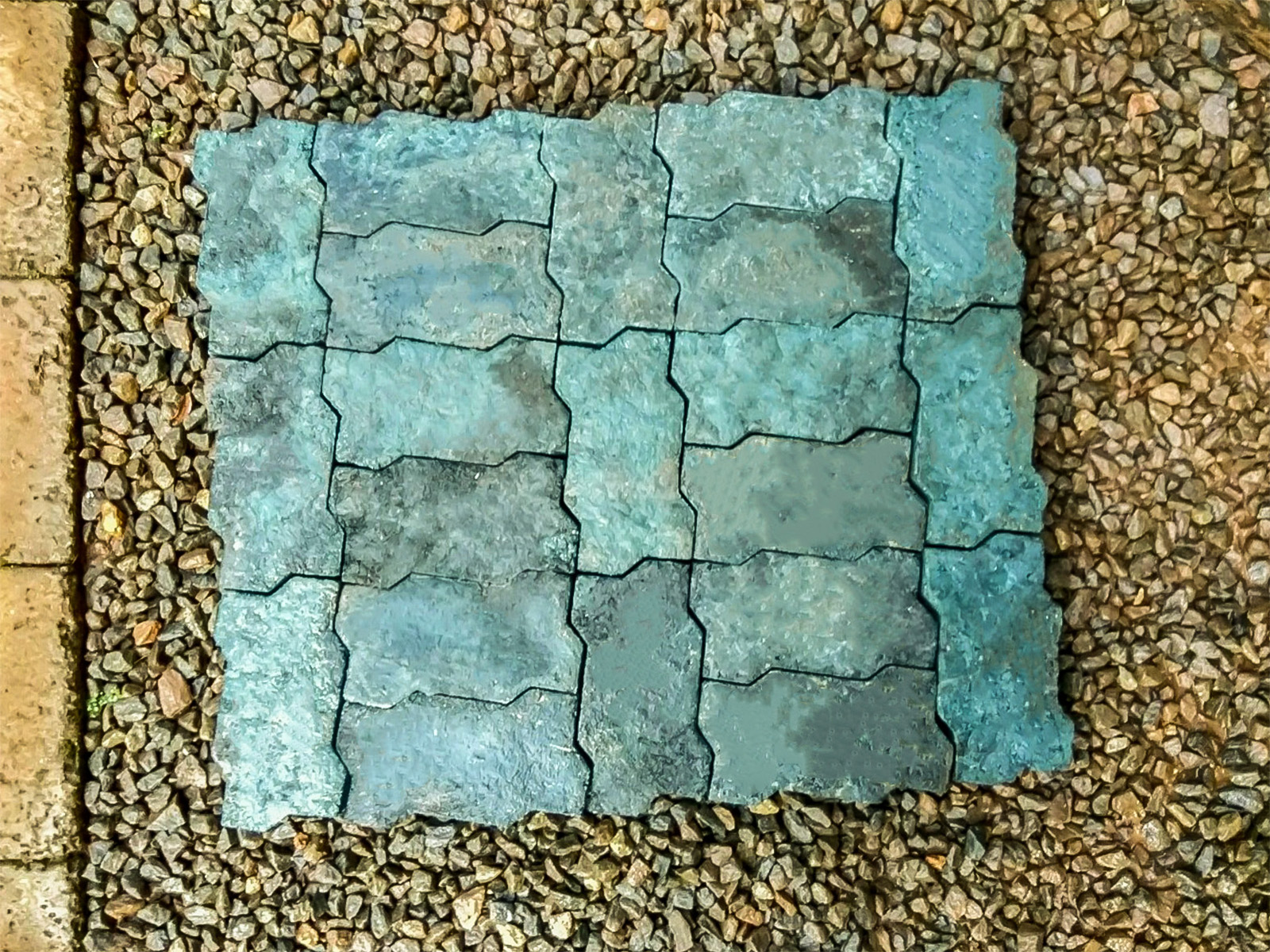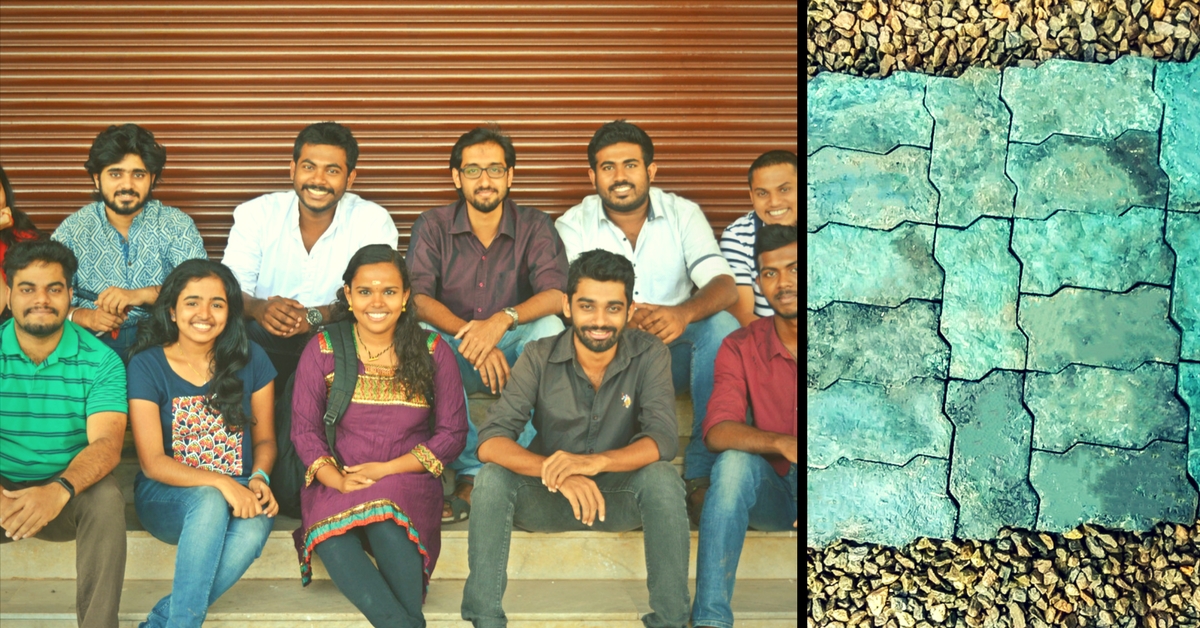Kevin Jacob, a graduate from Model Engineering College, Kerala, talks about how a group of engineers have developed a way to tackle plastic waste by transforming it into bricks.
All around when everyone saw garbage, in the infamous landfills brimming with plastic waste, we saw opportunity. We decided to take a different path than the campaigns for plastic bans with a practical solution – transforming plastic waste into solid paving bricks.
We were inspired by Dr. Ahmed Khan’s plastic road, and stories of the plastic bricks made in Ivory Coast and Uganda, and came up with a unique mixture using local ingredients after 2 months of research and experimentation at Karukutty, Cochin.
Once the first set of prototype bricks were ready, we headed straight to the Civil Engineering department of CUSAT.

These bricks passed all the recommended tests of quality and strength viz. compressive strength test, water absorption test, flexural test. Since it turned out stronger, less water absorbent, and more durable than the ordinary bricks we have applied for a patent in the methods and ingredients used in preparing the brick. All the works were done using crude machinery and minimal infrastructure.
We can make 2,500 bricks from 5 tonnes of plastic waste generated every day in Kochi. With better infrastructure support and funding, our product could be scaled higher and be used for making footpaths, paving roads, and in the future, with some improvement, even for building houses.
Some of us were members of TREE, the nature club of our college. It made us pledge to keep our campus plastic-free. But with time the urge for a zero waste zone led us to come up with a solution that can actually eradicate the problem of plastic waste.
This brick is the stepping stone to our dream of building ‘Zero-waste cities’ in India. This dream even made us quit our jobs and study opportunities abroad to become eco-preneurs – ‘eco-friendly entrepreneurs.’ Last year, we had also worked on manufacturing a smart fan-regulator, ‘i-fan,’ hybrid electric trains, project on early detection of Parkinson’s Disease etc.
My team includes Manyu J. Varma, Abhijith D, Edwin Basil James, Geethanjali T, Menon Bhagyalakshmi, Arjun Sasikumar, Julian Sara Joseph – alumni of MEC; Sreelakshmi P V, alumna of Adi Shankara Institute of Engineering and Technology; Mevin Jacob, 4th-year student at SCMS School of Engineering and Technology; Fevin Basil James, 2nd year student at Dr. Somerwell Memorial CSI Medical College, and Saffin Nazeer are also part of the projects.
Three of us got an opportunity to be trained by the pioneer Rajesh Nair himself, on ‘Innovation’ at the first Fab-Lab of India, Coimbatore. I (Kevin) had the blessing of being one of the few candidates to be selected for the MIT BootCamp on Innovations and Entrepreneurship. This would not have been possible without the support from both my college faculty and the government.
Currently we are working on building a fully automated zero-pollution electric plant where plastic waste can be converted into paving bricks and the oil produced as a byproduct can be collected as well. As Julian puts it “A giant machine that eats plastic all day and gives out useful bricks with zilch pollution” is what we are looking forward in the coming days.
Our vision is to set up the plants in all municipalities and panchayats making them zero plastic waste zones.
If given proper funding and timely support, several teams like ours may come forward with eco-friendly and practical solutions for the urban challenges.
The one question that we would like to shout out would be, “Cities like New York, San Francisco and every city of Sweden, are reaching their goals of becoming a ‘zero-waste’ city, with a population size much higher than that of the cities in India, then why not us?’
Know more about the project by writing to Kevin at kevinjacob.mec@gmail.com.
(Written by Kevin Jacob)
Like this story? Or have something to share? Write to us: contact@thebetterindia.com, or connect with us on Facebook and Twitter.
NEW: Click here to get positive news on WhatsApp!
If you found our stories insightful, informative, or even just enjoyable, we invite you to consider making a voluntary payment to support the work we do at The Better India. Your contribution helps us continue producing quality content that educates, inspires, and drives positive change.
Choose one of the payment options below for your contribution-
By paying for the stories you value, you directly contribute to sustaining our efforts focused on making a difference in the world. Together, let's ensure that impactful stories continue to be told and shared, enriching lives and communities alike.
Thank you for your support. Here are some frequently asked questions you might find helpful to know why you are contributing?

